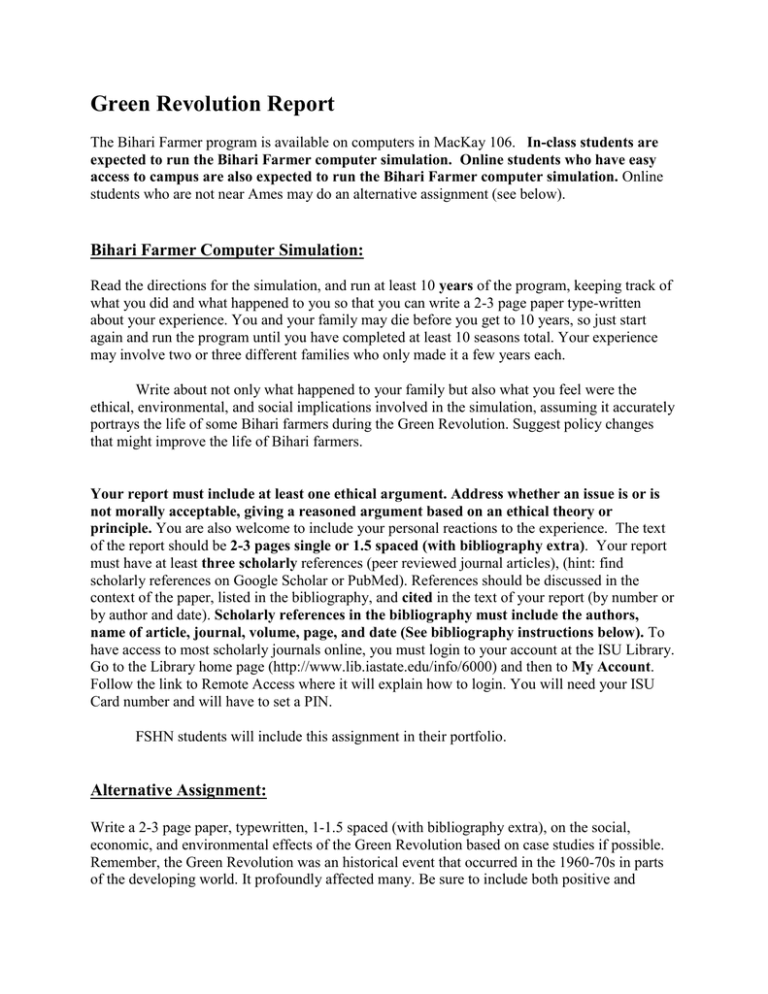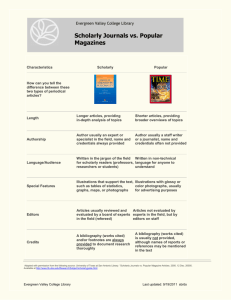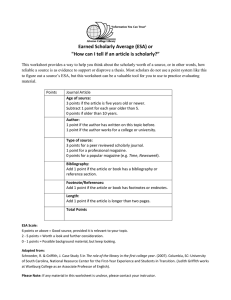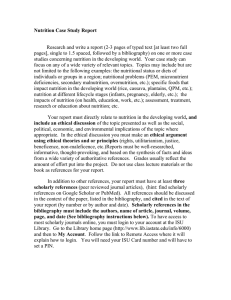Green Revolution Report
advertisement

Green Revolution Report The Bihari Farmer program is available on computers in MacKay 106. In-class students are expected to run the Bihari Farmer computer simulation. Online students who have easy access to campus are also expected to run the Bihari Farmer computer simulation. Online students who are not near Ames may do an alternative assignment (see below). Bihari Farmer Computer Simulation: Read the directions for the simulation, and run at least 10 years of the program, keeping track of what you did and what happened to you so that you can write a 2-3 page paper type-written about your experience. You and your family may die before you get to 10 years, so just start again and run the program until you have completed at least 10 seasons total. Your experience may involve two or three different families who only made it a few years each. Write about not only what happened to your family but also what you feel were the ethical, environmental, and social implications involved in the simulation, assuming it accurately portrays the life of some Bihari farmers during the Green Revolution. Suggest policy changes that might improve the life of Bihari farmers. Your report must include at least one ethical argument. Address whether an issue is or is not morally acceptable, giving a reasoned argument based on an ethical theory or principle. You are also welcome to include your personal reactions to the experience. The text of the report should be 2-3 pages single or 1.5 spaced (with bibliography extra). Your report must have at least three scholarly references (peer reviewed journal articles), (hint: find scholarly references on Google Scholar or PubMed). References should be discussed in the context of the paper, listed in the bibliography, and cited in the text of your report (by number or by author and date). Scholarly references in the bibliography must include the authors, name of article, journal, volume, page, and date (See bibliography instructions below). To have access to most scholarly journals online, you must login to your account at the ISU Library. Go to the Library home page (http://www.lib.iastate.edu/info/6000) and then to My Account. Follow the link to Remote Access where it will explain how to login. You will need your ISU Card number and will have to set a PIN. FSHN students will include this assignment in their portfolio. Alternative Assignment: Write a 2-3 page paper, typewritten, 1-1.5 spaced (with bibliography extra), on the social, economic, and environmental effects of the Green Revolution based on case studies if possible. Remember, the Green Revolution was an historical event that occurred in the 1960-70s in parts of the developing world. It profoundly affected many. Be sure to include both positive and negative effects of the Green Revolution, and be specific concerning the location, crops, kinds of people affected, etc. How did the Green Revolution impact hunger? Who benefitted? Who suffered, and why? What was it like for Green Revolution farmers and their families? Your report must include at least one ethical argument. Address whether an issue is or is not morally acceptable, giving a reasoned argument based on an ethical theory or principle. Your report must have at least three scholarly references (peer reviewed journal articles), (hint: find scholarly references on Google Scholar or PubMed). References should be discussed in the context of the paper, listed in the bibliography, and cited in the text of your report (by number or by author and date). Scholarly references in the bibliography must include the authors, name of article, journal, volume, page, and date (See bibliography instructions below). To have access to most scholarly journals online, you must login to your account at the ISU Library. Go to the Library home page (http://www.lib.iastate.edu/info/6000) and then to My Account. Follow the link to Remote Access where it will explain how to login. You will need your ISU Card number and will have to set a PIN. FSHN students will add their report to their portfolio. Grading Rubric: A: Engaged, thoughtful presentation of the course of the simulation and excellent analysis of the social, ethical, economic, and environmental implications of the Green Revolution farming experience. Report integrates and interrelates the Green Revolution farming experience with other concepts and ideas covered in class relating to poverty, ethics, agriculture, women’s status, etc. Scholarly references are used to back up the analysis. Suggestions are made for changes in policy that could improve the life of green revolution farmers. B: Good presentation of the course of the simulation and analysis of the social, ethical, economic, and environmental implications of the Green Revolution farming experience. Does more than a minimal job of integrating and interrelating the Green Revolution farming experience with other concepts and ideas covered inclass relating to poverty, ethics, agriculture, women’s status, possible policy changes, etc. Scholarly references are used to back up the analysis. C. Fair presentation of the course of the simulation and analysis of the social, ethical, economic, and environmental implications of the Green Revolution farming experience. Integrates the Green Revolution farming experience with other concepts and ideas covered in class relating to poverty, ethics, agriculture, women’s status and policy changes. Scholarly references are used to back up the analysis. Bibliography Instructions: 1. Citations in the text: When you write about ideas or scientific information presented in an article, you must cite the article where you got the information. Try to avoid the use of direct quotations. Instead, as a science writer, your job is to explain the science to the reader, and to cite the source of the information. Cite publications in the text with the author’s last name and the year, in parentheses. For two authors, use both names. For multiple authors, use "et al." after the first author’s name. If you mention the author in the text, cite the year in parentheses. These citations are designed to allow one to look up the reference easily in the back of the paper by name and date. Examples: 1. The starch granules are normally elongated in the milk stage (Brown, 1956). 2. Hendrich and others (2009) reported . . . 3. …other work (Ford and Fuchs, 2004) has shown that… …and recent work (Birt et al., 2010) has shown that ... …several investigators (Brown, 1956; Birt et al., 2010) have shown that… 5. …new developments in technology (IFT, 2005) indicate... 2. Format for References at the end: List only those references cited in the text. References should be flush with the left margin, listed alphabetically by the first author's last name. Note: For Scholarly References, the Authors, Title, Journal Number, Volume and Pages are ESSENTIAL INFORMATION. The URL is not sufficient. Science Direct is not a journal, it is simply a web source for journal articles! Scholarly Journal Article (internet source): Authors (LastName FI,). Year. Article title. Journal title,Volume number: inclusive pages. URL; date accessed.. Example: Dakwa S, Sakyi-Dawson E, Diako C, Annan NT, Amoa-Awua WK. 2005. Effect of boiling and roasting on the fermentation of soybeans into dawadawa (soy-dawadawa). Int. J. Food Microbiol. 104:1, pp. 69-82. Available at: http://www.sciencedirect.com/science/journal/01681605; Accessed August 31, 2005. Scholarly Journal Article (print source): Authors (LastName FI,). Year. Article title. Journal title, Volume number (issue number, if available): inclusive pages. Example: Smith JB, Jones LB, Racklly KR. 1999. Maillard browning in apples. J Food Sci 64(4):512-8. Scholarly Book : Author(s) or [editor(s)]. Year. Title. Place of publication: publisher name. Number of pages. Example: Spally MR, Morgan SS. 1989. Methods of food analysis. 2nd ed. New York: Elsevier. 682 p. Internet Article: Author(s) if available (LastName FI,) or abbreviated name of website used in text citation, and full name of website in parentheses. Year. Article title. Retrieval date. URL. Example: IFT (Institute of Food Technologists) Daily News Reader. January 2005 Archive. 2005. Bayer and Cargill to produce specialty canola oil. Retrieved September 1, 2005. http://www.ift.org/cms/Sa




